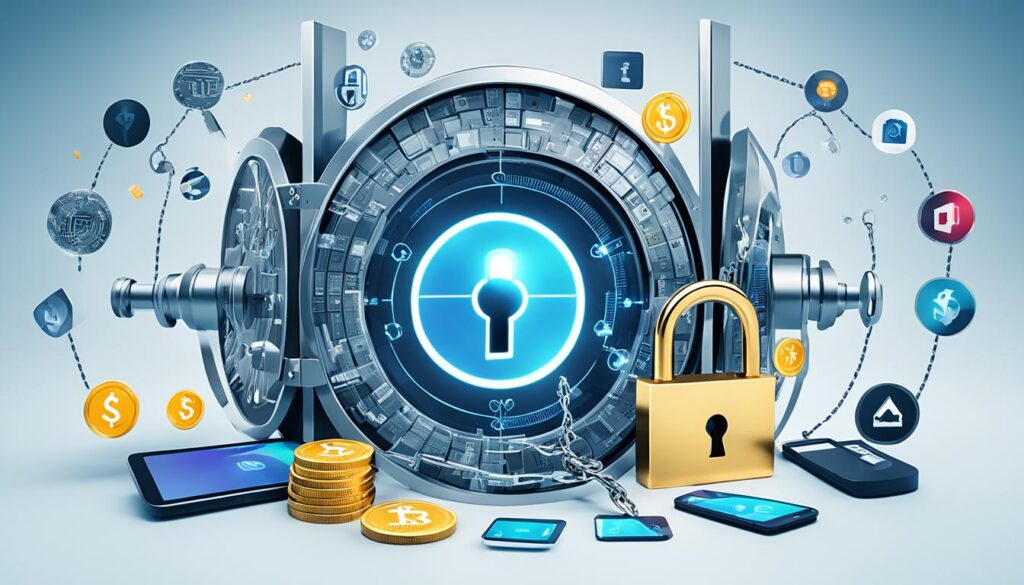Did you know the average American has about 200 online accounts? These include financial accounts, social media, email, healthcare portals, and entertainment platforms. With so many digital footprints, managing digital assets is key in estate planning. Not planning for these assets can cause big financial and emotional problems for your loved ones after you’re gone.
As technology keeps getting better, planning for our digital assets is more important than ever. In this article, we’ll look at the challenges of managing digital assets. We’ll also talk about the steps you can take to make sure your digital legacy is looked after.
Key Takeaways
- The average American has about 200 online accounts, creating a big digital footprint that needs to be part of estate planning.
- Billions of dollars go unclaimed every year because digital accounts are forgotten when the owner dies. This shows the financial risk of ignoring digital assets.
- Company policies and laws are not always clear, making it hard for executors to handle digital assets after someone dies.
- Adding digital assets to your estate plan makes transferring them easier and avoids legal problems for your family.
- Talking to an experienced estate planning expert is key to make sure your digital assets are safe and taken care of.
Understanding Digital Assets in the Modern Era
In today’s world, the term “assets” goes way beyond old-school physical and financial items. We now have many digital assets that are very valuable, both to us and in money terms. It’s key to know what these digital assets are and why managing them is so important.
What are Digital Assets?
Digital assets include things like cryptocurrency, social media profiles, online bank accounts, digital photos and videos, emails, and virtual property in online games. These items can mean a lot to us, both emotionally and financially. That’s why they’re a big part of what makes up our digital estate.
The Importance of Digital Asset Management
Managing your digital assets is very important for a few reasons. First, it makes sure your loved ones can get to and keep your digital stuff after you’re not here anymore. Without a plan, your digital assets could be lost, leaving your heirs without what’s theirs. Second, it helps your executor or administrator a lot, as they won’t have to spend a lot of time finding and handling your online accounts. Lastly, it keeps your private info safe and stops others from getting into it without permission.
By understanding what digital assets are and why we need to manage them, we can protect our digital legacies. This ensures our online stuff goes smoothly to our loved ones.

Challenges in Accessing Digital Assets After Death
Managing the digital assets of someone who has passed away can be tough. It’s hard to get into their accounts without the right legal papers or ownership. This could break company rules and privacy laws, leading to big problems.
Company Policies and Privacy Laws
Many online services have strict rules about who can access accounts after someone dies. Trying to get into an account by pretending to be the dead person or without permission is wrong. It can also break privacy laws.
Google says it will delete accounts that haven’t been used in 2 years, including those of people who have died, starting December 1, 2023. This shows why planning for digital assets is important. It helps make sure important info and assets aren’t lost.
Risks of Unauthorized Access
Trying to get into a dead person’s digital accounts without the right legal papers can lead to big trouble. Since 2016, people in charge of estates can get into digital accounts like they own them. But, if they’re not officially in charge, they could face legal trouble.
- Cryptocurrency in estates can cause taxes because of its value changes.
- Not handling crypto assets right can lead to legal fights or tax issues.
- A survey showed 67% of people haven’t planned for their digital assets, showing many aren’t ready.
- About 58% of people haven’t organized their digital stuff or shared login info, making it hard for others to get into their accounts after they’re gone.
Dealing with digital assets after someone dies needs careful planning and following the law and platform rules. Not doing this can cause big problems and legal issues for the estate and its heirs.

Digital Assets in Estate Planning
Our lives are now filled with online accounts, digital files, and virtual possessions. These digital assets are key to our personal and financial lives. It’s vital to include them in our estate plans.
Incorporating Digital Assets into Your Estate Plan
To protect your digital legacy, list your digital assets in your estate plan. This means making a detailed list of your online accounts and login details. You should include things like:
- Financial accounts (e.g., online banking, investment portfolios, cryptocurrencies)
- Social media profiles (e.g., Facebook, Twitter, Instagram)
- Email accounts
- Online storage and cloud-based services (e.g., Google Drive, Dropbox)
- Digital media (e.g., photos, videos, music libraries)
- Domain names and websites
- Online business assets (e.g., ecommerce stores, digital products)
- Loyalty program accounts (e.g., airline miles, reward points)
After making this list, you can decide in your will or trust how your digital assets should be handled after you pass away. You can tell who should access your accounts, how they should be managed, and what to do with the assets (like keeping, deleting, or giving them to others).
Keep your digital asset list away from your other estate planning documents. It has sensitive info. Use a secure password manager or encrypted file to protect it.
Adding your digital assets to your estate plan makes sure your loved ones know how to handle your online stuff and digital goods after you’re gone. This avoids problems, financial losses, and losing valuable digital items.
Essential Digital Assets to Include
When planning your estate, don’t forget about your digital assets. These include online banking, social media, and even cryptocurrency. It’s important to include these in your estate plan to protect your online life and make things easier for your family.
Here are some key digital assets to add to your plan:
- Online banking and investment accounts, including checking, savings, retirement, and cryptocurrency wallets
- Social media profiles, such as Facebook, Twitter, LinkedIn, and Instagram
- Email accounts, both personal and professional
- Cloud storage accounts, like Google Drive, Dropbox, and iCloud
- Online shopping and subscription services, such as Amazon, Netflix, and Spotify
- Websites, blogs, and other digital content you own or manage
- Digital assets with sentimental value, like photos, videos, and audio recordings
Remember, the rules for managing and passing on these digital assets can change. It’s key to keep up with the latest in estate planning and digital asset laws. This ensures your wishes are followed correctly.
It’s also vital to update your estate plan regularly. New digital items can be added or old ones can change. Working with experts in estate planning helps protect your digital legacy. It also gives your loved ones the info and access they need to manage your online life after you’re gone.
What Happens When No Provisions Are Made?
Not planning for digital assets can lead to big problems. When someone dies without a plan, their executor faces a tough task. They must deal with the digital assets left behind.
The Executor’s Responsibilities
The executor has to find, access, and manage the deceased’s digital assets. This is hard because they need to prove they can get into these accounts. They must patiently contact companies to get into accounts like banking and social media.
This process takes a lot of time and can be frustrating. It’s hard for accounts needed to keep the deceased’s life running smoothly. The death certificate links to the Social Security number, alerting big financial places but not all online accounts.
Unclaimed Digital Assets
When there’s no plan for digital assets, they might not be claimed. Billions of dollars in digital assets are lost each year because no one claims them. This happens with things like online shopping accounts and social media profiles.
Without the right info and access, the executor can’t find or manage these accounts. This means the assets could be lost forever.
Not planning for digital assets causes big problems for the executor and can lead to losing valuable digital stuff. It’s important to plan ahead to keep a person’s digital life safe and in order.
The Role of Estate Planning Professionals
In today’s digital world, estate planning experts are key in managing digital assets. They know how to handle the special issues of digital assets in estate planning.
Guiding Clients in Digital Asset Management
Estate planning pros work with clients to make sure digital assets are part of wills and trusts. They help make a list of all digital stuff, like emails, social media, online banking, crypto, and digital art. Knowing all about a client’s online life is key to a strong estate plan.
Educating on Digital Asset Preservation
These experts teach clients why keeping digital assets safe is important. They explain the emotional, money, and legal sides of digital ownership. This way, clients learn to take care of their online stuff for the future.
They also help pick a digital executor who knows how to handle and share digital assets after someone dies. Plus, they talk about legal ways to keep digital accounts safe, like using password managers and cybersecurity steps.
Estate planning pros are crucial in dealing with digital assets. They make sure digital legacies are looked after and passed on as the owner wanted.
Safeguarding Your Digital Legacy
Our lives are now deeply connected to many online accounts and digital assets. These include social media profiles and banking info. It’s vital to protect your digital assets so your legacy stays with your loved ones.
Understanding the value of your digital assets is key. Most people under 70 have over 160 online accounts. These range from banking to social media. Protecting these assets is now a big part of estate planning.
Start by making a list of all your online accounts and digital assets. Include login details and how to handle each one. Choose a trusted person to manage your digital assets after you’re gone.
Adding your digital assets to your estate plan helps your family. By 2015, 47 states had laws to make managing digital assets easier after someone dies. An estate planning expert can guide you through this process.
Use the latest security like two-step verification for your accounts. This extra step helps keep your online stuff safe, even after you’re gone.
By planning and protecting your digital assets, you keep your legacy safe. Your loved ones can keep your online presence alive, just as you wanted.
Your digital assets show your life, experiences, and connections. Protecting your digital legacy keeps your online identity and unique digital footprint alive for the future.
Conclusion
Planning for your digital assets is key in estate planning. It ensures our online presence and digital legacy are safe. Working with our estate planning experts at GC Peters helps you follow through with your wishes.
Our digital assets, like email, social media, cryptocurrencies, and digital media, are big parts of our lives today. It’s crucial to manage and share these assets after we’re gone. By making a detailed list of our digital assets, choosing a digital executor, and stating our wishes, we keep our online presence safe.
Book a consultation with us today to start safeguarding your digital assets.

